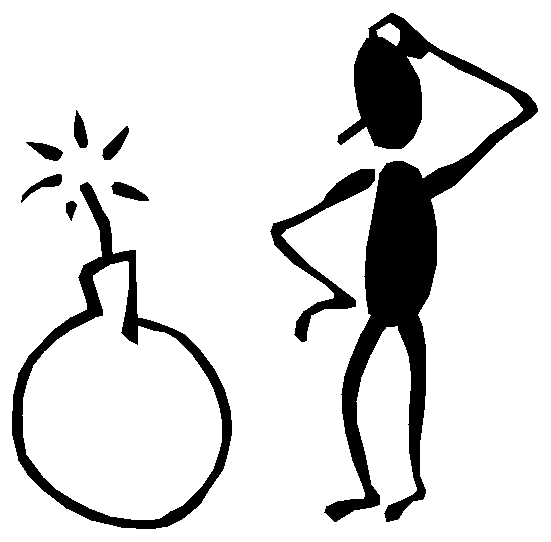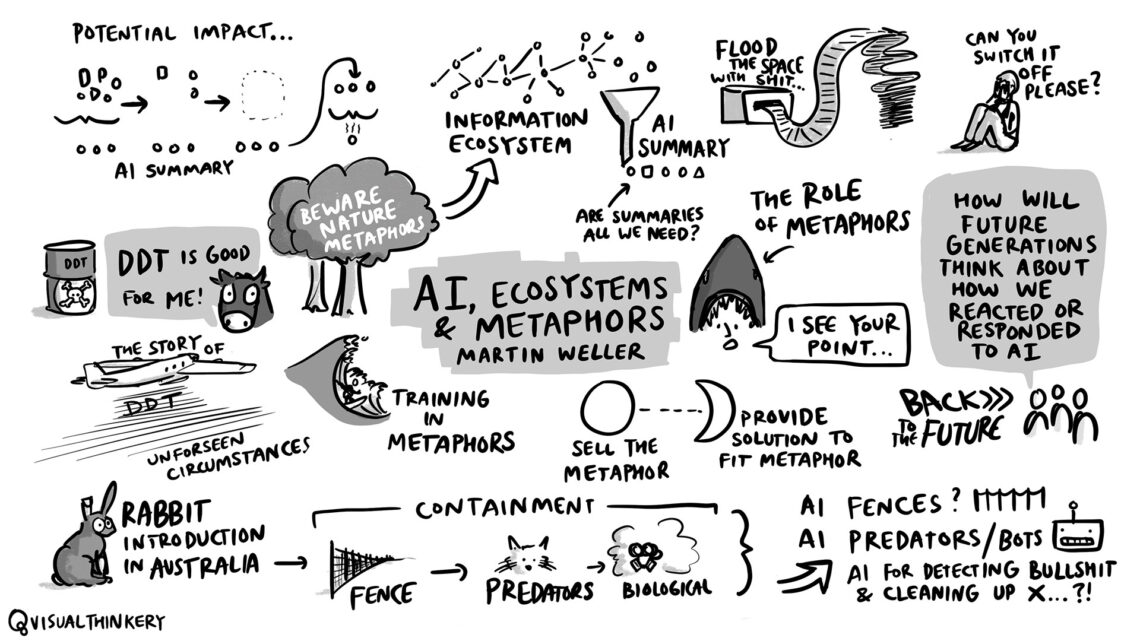AI
-
Recalibrating your analogue
I’ve seen a few stories recently about how people (often men) are sort of disappearing into AI blackholes. Whether it’s being convinced you are a spiritual leader, hunted by the CIA, unhealthy sexual fantasies, or generally reinforcing self-beliefs it’s hard to see how this is going to stop. As humans we’re programmed to anthropomorphise, we see Jesus’s face in toast for goodness sake, so even when you know it’s not real, it’s pretty hard to resist the emotional response that this AI tool genuinely knows you and is talking to you. This is going to be bad news for everyone. Young teenage boys will be creating the women of their…
-
Creativity, AI and awkward questions
Some of you will have seen how at least one author has been caught accidentally leaving AI prompts within the finished text of their book, and also how a suggested summer reading list in the Chicago Sun-Times contained AI hallucinations for books that don’t exist. There was, rightly, an outcry against this laziness, and a sense of being cheated (also, does no-one do any editing anymore?). But beyond these obvious, egregious examples, I find the question of artistic integrity (and related, academic integrity) interesting in general, and how the use of AI makes us ask difficult questions. There is a lot of puritanism around the use of AI in any…
-
AI’s clipart problem… or is it?
Clip art used to require specialist access and skills. It was literally clipped stock art, that could be used in creating physical paste-ups which would be photographed to create ads (I remember a friend of mine who worked in graphic design in the 80s having widely admired scalpel skills for cutting out images). Then in the late 80s it became almost entirely digital with desktop publishing, but this was still largely the domain of professionals. It was with the advent of the Microsoft products such as Word and Powerpoint with their inbuilt clip art in the 90s and then the web that widespread use of clip art became possible for…
-
AI in creative writing
I’m generally against using AI to creative ends, as I’ve mentioned several times, for me it kind of defeats the point. The creativity you are engaging in is the thing. However, I’ve been writing a psychological horror novel over the past few months though, and I though I’d experiment with it. I was at around 60,000 words, so there was a big chunk of content to play with. I like writing so the intention here was more to understand uses of AI than to ease any writing. My conclusions are therefore more about general lessons we can learn about AI than writing. I tried Claude, ChatGPT and Gemini with various…
-
Let’s get specific
Last week marked the launch of a series of reports commissioned by the N-Tutorr project for the National Digital Leadership Network in Ireland. They’re an excellent set of reports, offering high level and practical insights. I’ll look at some of the other reports in a later post, but I want to draw out an element of my own one in this post. My report acted as something of an overview to several others, which then took a deeper dive. I looked at five trends relating to new models of teaching through technology, namely Hybrid and Blended Modes for Learning and Working, Microcredentials, Generative AI, Extended Reality and Adaptive and Personalised…
-
Monthly round-up March 25
(Teilo was my writing buddy this month) I’ll say this for Trump and Musk – when they make things go to shit, they make things go to shit fast. It seems strange to think of the world order back in January, that seems like the 1970s now. Like many people I’ve been divesting myself of support for American billionaires. On a regular basis we already have a network of independent local providers for a lot of products and services. But I’m a lazy consumer often, I admit, and Amazon had become the default for miscellaneous products. Now that I’m eschewing it, I’m reminded of when the web was still relatively…
-
What type of blog am I?
I took part in a Reclaim Hosting session as part of the blogging community yesterday. Maren ran the session on How to Get Your Blogging Mojo Back and Lee Skallerup Bessette gave a fascinating talk on her blogging history. One topic she raised was a thorny one that many of us have wrestled with in the blogging area. And that is, whether to have specialised blogs or an all-encompassing one. Lee talked about how she had established different blogs for swimming, knitting as well as ed tech. Jim Groom stated that he made a decision early on that his blog would be a big messy bucket for everything he was…
-
AI, ecosystems and metaphors
(image is a Bryan Mathers sketch of my keynote) As I mentioned in my last post, I gave a keynote at the Education After the Algorithm conference in Dublin last week. It was a thoughtful, engaging event, congrats to Eamon Costello and all involved. A screencast of my talk is below. I concentrated on two metaphors, which I’ve blogged here previously, namely DDT and the introduction of rabbits into Australia. My intention was twofold: to highlight how the information ecosystem may be prone to some of the similar impacts from AI agents as these environmental ecosystems were to the introduction of these outside agents; to demonstrate the utility of metaphorical…
-
AI and rabbits
For my upcoming keynote at the Education after the algorithm: Co-designing critical and creative futures symposium in Dublin, I am exploring metaphors relating to ecosystems and AI. I’ll blog the whole talk after the event, but one of those metaphors I am using is the introduction of the European rabbit to Australia. The background During the 18th and 19th centuries, the European rabbit was introduced into Australia primarily as a food resource and for hunting activities. There is a myth that the subsequent explosion of the rabbit population can be traced back to one single introduction, that by Thomas Austin in 1859. An English settler Austin wanted to establish a…
-
Socialist AI
(Image – Life is sharing, CC-BY some geezer called cogdog, who he?) I’ve been reading Brian Merchant’s Blood in the Machine recently. It’s an engaging account of the Luddite rebellion, which is well researched and told, but what really brings it to life are the direct comparisons he makes with Silicon Valley entrepreneurs and the mill owners, who use technology to accrue capital in the hands of a few, and take agency from working people. The fact that “luddite” is a derisory term instead of championing people who fought for their livelihood and humanity is a victory of those same entrepreneurs. Anyway, as was the intention of the book, it…









